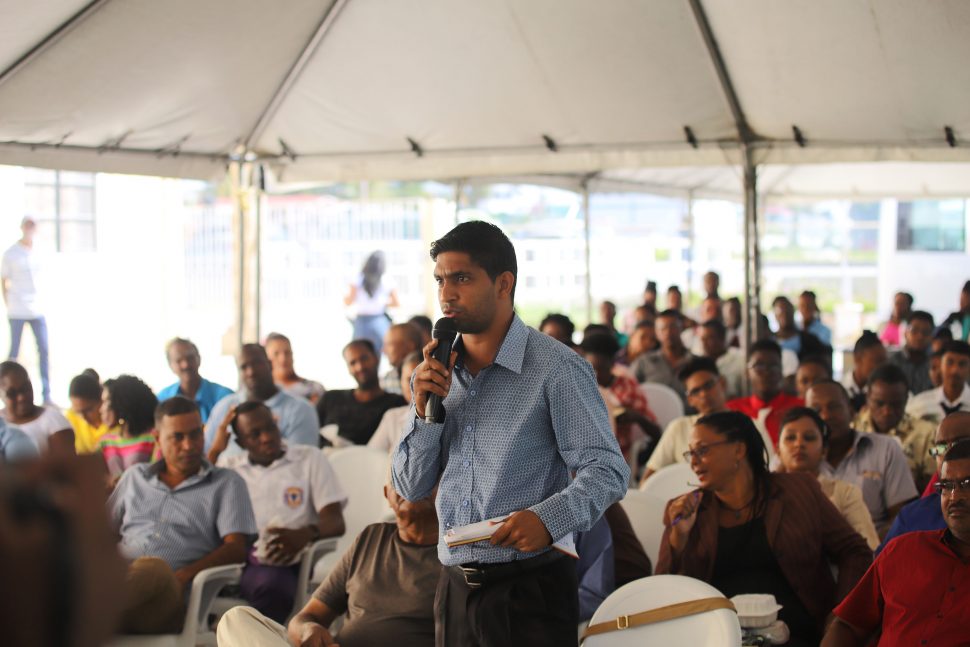In an effort to expose Guyana’s children to the new oil and gas sector, its opportunities, and the responsibilities that will come with being an oil producing nation, the Department of Energy is currently in discussion with the Ministry of Education to include applicable content in its new curriculum.
“We have been having discussions with the Ministry of Education and you may be happy to know that the ministry is at this moment revising its curriculum…so this is a prime opportunity for those changes to occur,” Head of the Department of Energy, Dr. Mark Bynoe, on Friday told the Region 4 Regional Democratic Council, at an oil and gas forum he hosted.
As part of a countrywide public stakeholders’ outreach programme, edification and sensitization process of the Ministry of Education, the energy department, and by extension the sector, has been carrying on a series of interactive meetings. On Friday, Bynoe met with councilors from the Neighbourhood Democratic Councils (NDCs) and the Regional Democratic Council of Demerara-Mahaica (Region Four), as well as officials from the Civil Defence Commission (CDC) and students from schools on the East Coast of Demerara.
He previously held similar events with youths in Georgetown and Linden. Then, the ministry had said it was held in an effort to increase the levels of awareness among youth on the oil and gas sector, educate them on the multiplier effects of the sector, and provide an opportunity for young people to participate in the discussion and decision-making process, with regards to the sector’s opportunities and potential challenges.
On Friday, Bynoe responded to questions from Regional Councilor Suresh Singh, who is also a teacher, and who queried what steps are being made to expose the nation’s children to the nascent sector, given that it will be this country’s highest income earner for many decades.
Singh, who teaches at the secondary level, explained that he yearns for a school curriculum that exposes and prepares local children with even basic knowledge of oil and gas and in so doing, also affords them additional career options. “Presently, the curriculum our secondary school in particular is using, it works as a good pull factor for students who are going to the field of doctor, lawyer, teacher and many other fields. But it does not seem to be a pull factor for the oil and gas fields,” he said, as he made reference to a number of careers Bynoe listed in the sector.
“Mr. Bynoe in his presentation would have listed careers … but presently, in our curriculum, we are not teaching our students for these areas. I would be happy to see if you can engage the Ministry of Education to have some amount of input in our schools maybe in the lower forms,” he said.
Bynoe reminded that currently, the Ministry is undertaking a curriculum reform project and he has suggested that elements of the sector be incorporated into it.
But he stressed that that while preparation for direct employment for the industry is needed, students need not saturate one area when the country has a holistic development plan that will require skills in all fields.
“Training, skill building and certification are absolutely necessary. Advise your constituents to plan for careers not only in oil and gas but for the transformation that is to come. We are working with the operators to find out what skills they will need and how we can work to provide those. Let us ensure we have the rudiments and the foundation [but] if you wanted to be a mechanical engineer, don’t change. If you are a carpenter or a mason, right now there is a shortage of properties in Georgetown, we need more buildings. We need to be able to demonstrate that we need more apartments. We need more people in the service sector,” he said.
“If the house you living in you don’t repair it, soon it falls to pieces. If these resources are ours and you don’t use them, others will come and use them for you. What you don’t use you will lose. We have to ensure that we are positioning ourselves to benefit from those resources. You have to be aspirational. If you don’t have a dream too bad for you because everything starts with a dream. Do not let the doomsday sayers say to you it is not possible, it is possible,” he added.
The meeting was disrupted after about forty-five minutes, during the question and answer segment, when People’s Progressive Party/Civic Councilor, Rajanand Singh, took the microphone and began raining personal insults against a technical and vocational coordinator, Bynoe and the APNU+AFC Government.
Singh also shouted that the APNU+AFC government was a failure and that the forum was a political stunt. He said that Guyana’s Technical Vocational Programme was substandard and only had one phase.
It took several minutes before the public address system was turned off and most students walked out while some who stayed began shouting “this is not the time and place” and “shame”.
When order was restored, Bynoe and government Advisor Matthew Wilks, fielded other questions.
For Wilks’ part, he spoke on reasons why oil refineries are established and reiterated that while ring fencing is not in any of the current Production Sharing Arrangements with oil companies, it will form part of the template for all others, when government begins looking at new licensing.






